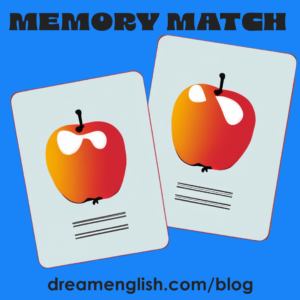Quick Game Facts:
- Name: Memory Match
- Recommended Ages: 3-12
- Materials Needed: Flashcards with matching pairs, table or floor space
- Prep Time: Minimal

Introduction:
Calling all EFL and ESL teachers of young learners! Are you ready to inject some excitement into your English lessons? Look no further than “Memory Match”! This engaging game is not only lots of fun, but it also serves as a powerful tool for expanding your students’ English vocabulary. So, grab your flashcards and get ready to embark on an unforgettable learning adventure!
Overview:
- Objective: Find matching pairs of flashcards.
- Recommended Ages: 3-12
- Materials Needed: Flashcards with matching pairs, table or floor space
- Prep Time: Minimal
Setting Up the Game:
Preparation for “Memory Match” is a breeze! Simply grab your flashcards, give them a good shuffle, and lay them face down in a grid on a table or the floor. The size of the grid can be adjusted according to the age and abilities of your students. Start with a smaller grid for younger learners, and gradually increase the challenge as their memory skills grow!
Playing Memory Match:
Let the games begin! “Memory Match” is as simple as it gets. Players take turns flipping over two cards, aiming to find matching pairs. When a match is made, the player keeps the cards and gets another turn. If the cards don’t match, they are flipped face down again, and the next player takes a turn. The game continues until all the cards have been matched.
Making It Educational:
While having a blast with “Memory Match,” why not sneak in some English learning too? Encourage your students to say the word on the card when they flip it over. To level up the challenge, ask them to use the word in a sentence. This way, they’re not only practicing vocabulary but also gaining confidence in using the words in context.
Tips and Variations:
- Start with a smaller grid for younger children and gradually increase the number of cards as they become more confident.
- For better comprehension, use flashcards with words and corresponding images to provide visual cues.
- Amp up the excitement by timing the turns, adding a touch of challenge to the game.
Benefits of Memory Match:
In addition to oodles of joy and laughter, “Memory Match” offers numerous benefits for your young language learners. It hones their memory skills, enhances concentration, reinforces vocabulary acquisition, and boosts retention. With its interactive nature, the game ensures maximum engagement, turning English learning into an exciting adventure!
Conclusion:
“Memory Match” is the ultimate game that seamlessly combines enjoyment and English learning. Your little language learners will eagerly anticipate each turn, improving their vocabulary and memory skills along the way. So, gather your flashcards, set up that exhilarating grid, and watch the magic unfold in your classroom. Stay tuned for more fantastic game ideas in our upcoming blog posts. Now, let the memory-matching extravaganza begin!